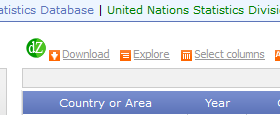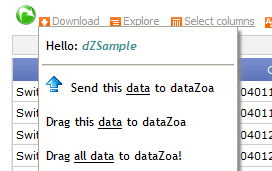Difference between revisions of "Data From the Web"
From dataZoa Wiki
(→Web Data Index) |
(→About the dZ-Dot) |
||
| Line 12: | Line 12: | ||
== [[About_the_dZ-Dot|About the dZ-Dot]] == | == [[About_the_dZ-Dot|About the dZ-Dot]] == | ||
| − | + | {{dZ-Dot_Bullets}} | |
| − | + | ||
| − | + | ||
Revision as of 12:30, 14 February 2017
Web Data Index
In Depth: Locate time-series data from hundreds of public sources.
Web Data Highlights
- When you drag-and-drop data series into dataZoa from other sites around the Web, we monitor for changes and make updates accordingly.
- For sites with important and closely watched data release schedules, we sync up as quickly as the sites allow.
- There are many nuances and details in the updating process, but generally speaking we check for changes everywhere at least once a day.
Automatic Updates
- When you drag-and-drop data series into dataZoa from other sites around the Web, we monitor for changes and make updates accordingly.
- For sites with important and closely watched data release schedules, we sync up as quickly as the sites allow.
- There are many nuances and details in the updating process, but generally speaking we check for changes everywhere at least once a day.
About the dZ-Dot
|
|
|
- The magic happens as the data lands in your account:
- The data is harmonized, so it immediately works with any other data in your account, from any other website
- The location is memorized, so we can check back periodically for updates and changes
- Then any changes are automatically propagated through related calculations, displays, and dashboards that use the series



